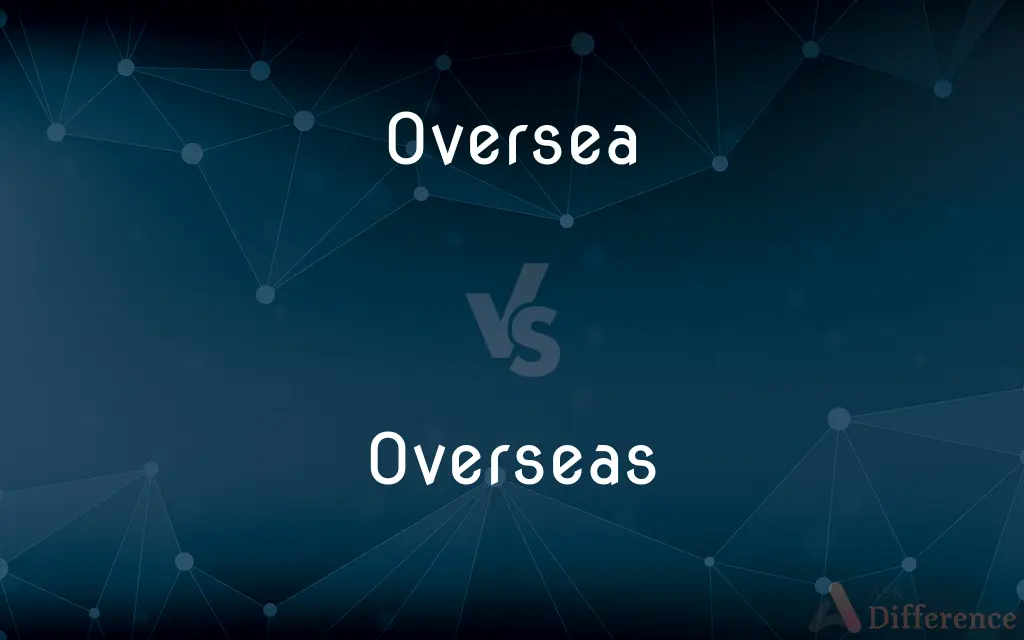Oversea vs. Overseas — What's the Difference?
By Tayyaba Rehman — Updated on November 7, 2023
"Oversea" is an adjective describing something related to foreign countries, typically across the sea, while "overseas" can be an adjective or adverb referring to locations abroad, especially across the sea.

Difference Between Oversea and Overseas
Table of Contents
ADVERTISEMENT
Key Differences
"Oversea" often serves as an adjective, emphasizing the involvement with or location across the sea. For instance, one might refer to "oversea territories" to describe regions beyond the domestic mainland. "Overseas," however, functions both as an adjective and an adverb, such as in "overseas markets" or "living overseas," implying a broader context of international scope. In contemporary usage, "oversea" is less common and may appear archaic, whereas "overseas" is widely used in modern English to denote international affairs or experiences abroad.
"Oversea" conveys a specific connection to other countries by way of the sea, evoking a sense of crossing water. For example, "oversea shipping" focuses on the transport of goods across the ocean. "Overseas," on the other hand, is more generic, not necessarily implying travel by sea. It could refer to any kind of international reach, as in "overseas education," where the method of crossing is not specified.
In business contexts, "oversea investments" might be used to discuss funds allocated to businesses in other countries, suggesting a direct, cross-sea link. "Overseas investments" have a more global connotation, encompassing any international investment opportunities, regardless of geography. Although "oversea" can still be found in formal or legal contexts, "overseas" has become the standard term in global discourse.
When discussing policies, "oversea policy" would typically refer to a nation's approach to its territories across the sea. "Overseas policy" would broadly refer to a country's foreign policy, including diplomatic, economic, and military strategies in other countries. It's important to note that while "oversea" might appear in historical or very specific contexts, "overseas" is more prevalent in everyday language.
"Oversea" and "overseas" share linguistic roots, and historically, "oversea" was used similarly to "overseas." However, language evolves, and "overseas" has largely taken precedence in contemporary language. It encompasses a wider range of meanings and applications, from studying abroad to global business operations, such as "companies operating overseas."
ADVERTISEMENT
Comparison Chart
Part of Speech
Adjective
Adjective/Adverb
Usage Frequency
Less common
More common
Context
Often historical or formal
Broad, including contemporary contexts
Implication
Directly implies crossing the sea
Can imply any overseas connection, not necessarily by sea
Example Usage
"Oversea colonies"
"Studying overseas"
Compare with Definitions
Oversea
Pertaining to countries across the sea.
She specializes in oversea trade laws.
Overseas
Beyond the boundaries of one's country.
They export their products overseas.
Oversea
Situated beyond the sea.
The company expanded its reach to oversea markets.
Overseas
In or to a foreign country.
After graduation, he decided to study overseas.
Oversea
Involving crossing the ocean.
The oversea voyage took three weeks.
Overseas
From another country.
Overseas investors showed great interest in the project.
Oversea
Related to or originating from foreign lands.
He is an expert in oversea relations.
Overseas
Connected with foreign countries, especially those across the sea.
She works in an overseas branch of the company.
Oversea
From across the seas.
The festival celebrated oversea cultures.
Overseas
Relating to or happening in another country.
He was sent on an overseas assignment for two years.
Oversea
Over the sea; abroad.
Overseas
Beyond the sea; abroad.
Oversea
Overseas.
Overseas
Of, relating to, originating in, or situated in countries across the sea.
Oversea
Alternative form of overseas
Overseas
Abroad.
Overseas branches of the company are doing well.
Oversea
Alternative form of overseas
Overseas
In or to a foreign country, especially one across the sea
He spent quite a lot of time working overseas
Oversea
Beyond the sea; foreign.
Overseas
From, to, or relating to a foreign country, especially one across the sea
Overseas trips
Oversea
Being or passing over or across the sea;
Some overseas trade in grain arose
Overseas
Used with ethnicities, nationalities, or religious affiliations: living (being resident) in a foreign country.
Overseas Chinese communities exist in North and South America.
Oversea
Beyond or across the sea;
He lived overseas for many years
Overseas
Across a sea; to or in an area across a sea.
Her overseas trip went well.
Overseas
Abroad.
He emigrated and now lives overseas.
Overseas
Across a sea; to an area across a sea.
She travelled overseas.
Overseas
In a foreign country;
Markets abroad
Overseas markets
Overseas
Being or passing over or across the sea;
Some overseas trade in grain arose
Overseas
Beyond or across the sea;
He lived overseas for many years
Overseas
In a place across an ocean
Common Curiosities
Does "oversea" imply travel by sea?
Yes, "oversea" typically implies a connection across the sea.
Does "oversea" have the same meaning as "overseas"?
While similar, "oversea" is less versatile and more specific to sea travel.
Is "oversea" still commonly used?
"Oversea" is less common today and can appear archaic.
Can "overseas" refer to air travel?
Yes, "overseas" can refer to any type of travel abroad.
Can "overseas" be used as both an adjective and an adverb?
Yes, "overseas" can function as both.
Can "oversea" be used to describe air travel?
Traditionally, no, it's specific to sea travel.
What does "overseas" imply?
"Overseas" implies international or abroad, not necessarily by sea.
Is "oversea" used in formal contexts?
"Oversea" may appear in formal or legal contexts but is generally less common.
How is "overseas" commonly used?
"Overseas" is used to refer to things related to foreign countries.
What is an "overseas experience"?
It refers to time spent abroad, in any capacity.
Is "overseas" used in American English?
Yes, it's common in American English.
Is "overseas" a modern term?
Yes, it's widely used in contemporary language.
Does "overseas" only relate to business?
No, it can relate to travel, study, living abroad, and more.
Can "oversea" describe international trade?
Yes, particularly trade across the sea.
What does "living overseas" mean?
It means living in a country different from one's home country.
Share Your Discovery

Previous Comparison
Inclusivity vs. Inclusion
Next Comparison
Dexterous vs. DexteriousAuthor Spotlight
Written by
Tayyaba RehmanTayyaba Rehman is a distinguished writer, currently serving as a primary contributor to askdifference.com. As a researcher in semantics and etymology, Tayyaba's passion for the complexity of languages and their distinctions has found a perfect home on the platform. Tayyaba delves into the intricacies of language, distinguishing between commonly confused words and phrases, thereby providing clarity for readers worldwide.














































